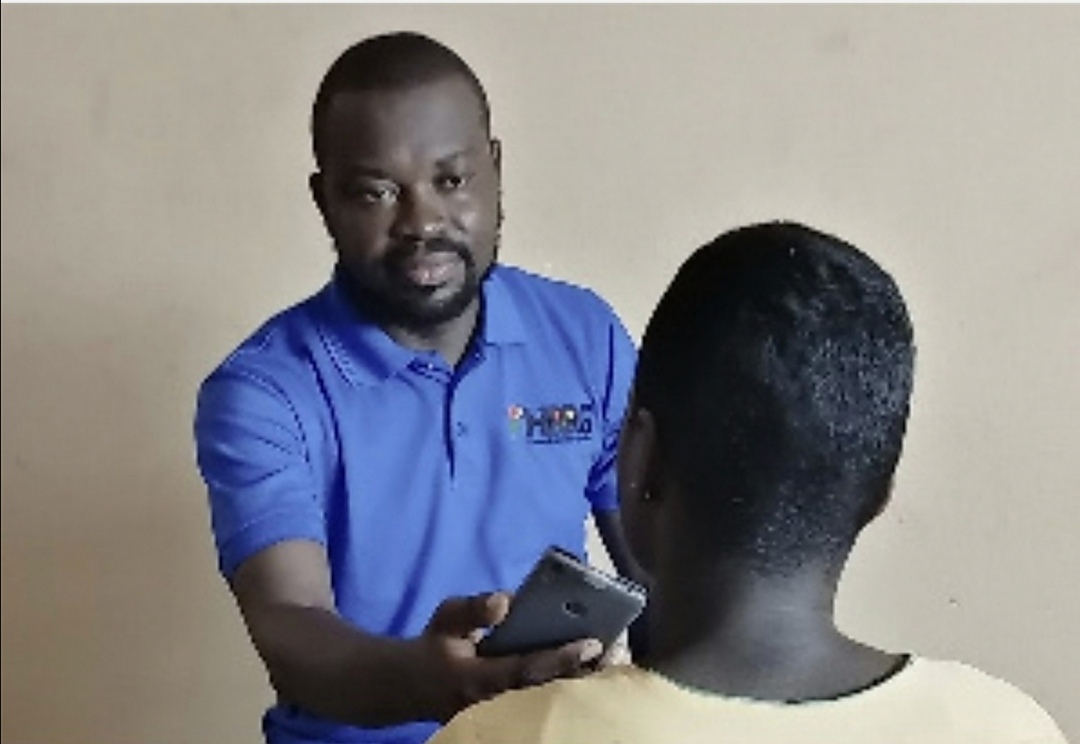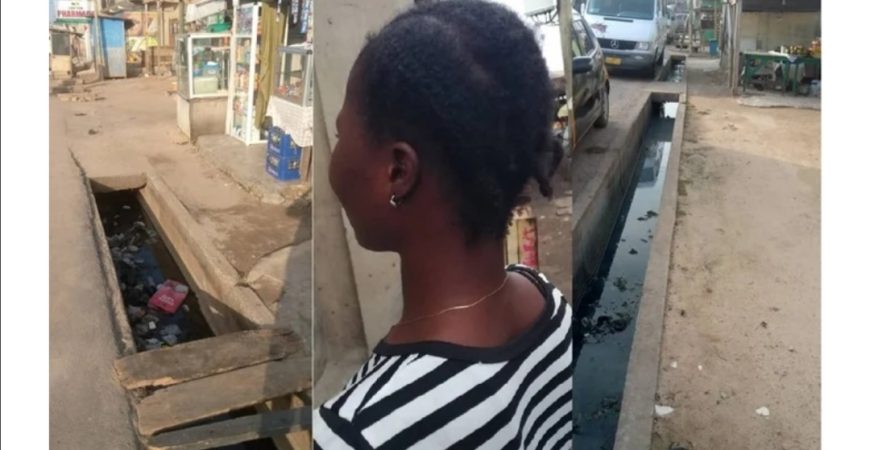Living without a toilet facility at home can be a harrowing experience for anyone, but for a 15-year-old patient who lives at Gbegbeyise, it is a daily nightmare.
The lack of basic sanitation facilities has made life unbearable for the teenager, who struggles to cope with the disease and the lack of access to a clean toilet.
In the Ablekuma West Municipality of the Greater Accra region, precisely situated under Shaibu-Gbegbeyise sub-district close to Dansoman, is the densely populated community of Gbegbeyise. Here, access to necessities like potable water, electricity, and toilet facilities is a luxury.
The majority of the people who live in Gbegbeyise are Christians, with a small number of Muslims and traditional believers. They rely on small-scale fishing and petty trading as their source of livelihood and local income generation.
55318 people were living in Shaibu-Gbegbeyise sub-district as of May 2023, according to annual population data for 2023 that the Ghana Statistical Service made available to the Ablekuma West Municipal Health Directorate.
Unfortunately, Gbegbeyise can’t claim to have a single hospital to care for its own in times of illness. Residents claim that the only medical facility in the area has been closed because every time it rains, the clinic also floods.
The residents have no choice but to seek medical care in the neighbouring communities, such as at Dansoman Polyclinic or Korle Bu Hospital, which are both about a 25-minutes’ drive away.
Typhoid fever is the most common infectious disease, and according to clinical data on cases of infectious diseases recorded in the Ablekuma Municipal Health Directorate, the Shaibu-Gbegbeyise sub-district is in the lead with a record of 1,633 cases out of 2,525 cases recorded only for 2023, which runs from January to May. Upper respiratory infections and diarrhoea diseases come next.
According to a study conducted by WaterAid Ghana, only 22% of Ghanaians have access to basic sanitation facilities, while 48% have access to clean water.
The lack of proper sanitation facilities has led to an increase in waterborne diseases like typhoid fever, cholera, and diarrhoea.

15-year-old girl with reporter Joseph Wemakor
The 15-year-old girl who suffered and later recovered from clutches of typhoid fever, Abena (not her real name) who wants to remain anonymous, narrated her ordeal to me during a visit to her home.
She lives with her grandparents and four siblings in a small, crowded room where they all sleep and cook.
The absence of a toilet facility means that they have to use a nearby bush as a toilet, which exposes them to the risk of contracting diseases like cholera, diarrhoea, and typhoid fever.
“The lack of a proper toilet facility has made my life difficult,” she said. “I have to crawl into the bush to defecate, which is not only degrading but also poses a great risk to my health, especially now that I am suffering from typhoid fever.”
The lack of proper toilet facilities is not unique to the teenager’s community. It is a widespread problem in Ghana, where 10% of the population practice open defecation.
Open defecation is the practice of defecating in open spaces like bushes, fields, or bodies of water. The practice is not only unhygienic but also poses a great risk to public health.
Typhoid fever is a bacterial infection that causes diarrhoea, high fever, and abdominal pain. The disease is caused by the bacterium Salmonella typhi, which is found in contaminated food and water.
The bacteria multiply in the intestinal tract and can spread to the bloodstream. It is transmitted from person to person through the faecal-oral route where an infected or asymptomatic individual (who does not exhibit symptoms) with poor hand or body hygiene passes the infection to another person when handling food and water.
The lack of access to clean water and sanitation facilities puts individuals at risk of contracting the disease.
Paratyphoid fever, a similar illness, is caused by Salmonella enterica paratyphi A, B, and C.
Usually, symptoms appear 1 to 3 weeks after exposure to the bacteria. Depending on the virulence of the infection symptoms can range from mild to severe.
The illness is characterized by extreme fatigue and increasing fever. Other symptoms include headache, lack of appetite, malaise, and an enlarged liver. Sometimes patients have diarrhoea, constipation, or a rash on their trunk.
Severe symptoms may appear 2 to 3 weeks after onset of the illness and may include intestinal haemorrhage or perforation.
Typhoid and paratyphoid fever remain a global public health burden, yet annual estimates of prevalence vary. Estimates have ranged between 9.9 and 24.2 million cases annually.
Similar differences in estimates are seen within countries but point to a serious health challenge. In Ghana, for instance, typhoid fever has been ranked among the top twenty causes of outpatient morbidity and constituted 1.2%, 1.7% and 1.3% of hospital admissions in 2017, 2016 and 2015 respectively.
According to the World Health Organization (WHO), typhoid fever is a major public health concern in developing countries, where access to clean water and sanitation facilities is limited.
The disease affects about 21.5 million people worldwide and causes around 200,000 deaths annually.
Abena’s illness was a harrowing experience for her and her family. She had to be hospitalized for two weeks and placed on a course of antibiotics.
While in hospital, the girl missed several weeks of school, and her grades suffered as a result.
The teenager’s grandfather, who is the breadwinner of the family, expressed his concern about the lack of basic amenities in their community.
“We have been living without proper toilet facilities for years,” he said.
“We have to rely on the bush and sometimes resort to using the beach as a place of convenience as nature calls which is not only unsanitary but also poses a great risk to our health. We need help to get a proper toilet facility.”
St Martin’s Memorial Hospital located at Dansoman Beach Road community is a destination to many patients who suffer from various diseases such as typhoid fever, cholera, malaria among others who visits regularly and daily to seek for medical treatment or cure.
The hospital, which is located in the Dansoman Beach Road neighbourhood, also serves ten (10) other nearby communities, including Gbegbeyise, Glefe, Atomic, Transformer, Agege, Karikari, Pambrose, Chorkor, Mpoase, and Korlebu, which are all included in the 4 sub-districts of the Ablekuma West Municipal of the Greater Accra Region.
In May 2023, Abena fell ill and was diagnosed with typhoid fever at Saint Martin’s Memorial Hospital. The girl’s doctor attributed her illness to the unsanitary living conditions in her community.
According to the doctor, typhoid fever is prevalent in areas with poor sanitation, a lack of clean water, and where open defecation is a common practice.
This practice not only poses a health risk to the family, but it is also a violation of their dignity and privacy.
Ms. Nadia Kafui Bokordedzi, the hospital administrator, revealed in an interview that among the list of cases reported daily at the hospital’s out-patient department, typhoid fever tops the list as a leading disease, followed by malaria, hypertension, ulcers, urinary tract infections, pneumonia, diarrhea, and sepsis, among others.
Reacting to Abena’s unfortunate situation, she averred that in many communities within the catchment of the Shaibu-Gbegbeyise sub-district where open defecation is a common practice, girls and women are particularly vulnerable to harassment and assault while using the bush or seashore as a toilet.
She further noted that a lack of proper sanitation facilities has a significant impact on education and economic opportunities, and girls, in particular, are dropping out of school in high proportions due to the lack of privacy and hygiene facilities.
Grace Arboah, a public health nurse manning the hospital who shared her experience, observed that most clients who visit the hospital first complain about headaches, including a feeling of feverishness, and end up attributing the cause to malaria while even waiting to be diagnosed by a medical doctor.
“I think I’m suffering from malaria even when I’m done taking the malaria course”.
“So, you have to tell the person that it is not only malaria that can cause headaches or fever but other health conditions like typhoid fever, diarrhea diseases and others”.
“So, after the test, you tell the patient that this and that is the outcome, and if the patient needs to be hospitalized, then the person is, but if he or she can go home, be put on medication, and be taught how to take the medications and how to prevent the recurrent infections”, she further explained.
Touching on the risk factors, she lamented the lack of access to basic amenities like clean water, toilet facilities, poor sanitation and hygiene practices, as well as overcrowding and inadequate housing, which are contributory factors putting many lives at risk of getting infectious diseases like typhoid fever, diarrhea, and others.
“Look at this community; if you take 10 houses, maybe just one out of them has washroom facilities; therefore, most of them do it in an open area or they go to the pit latrine or the seashore.
So having a place of convenience here is a problem. Also, how they prepare their meals, what goes into cooking, and all others, coupled with choked gutters here and there, as well as education on food hygiene, are poor here, so it could be a factor”. She revealed.
She therefore advised the community folks to always endeavour to drink purified water (boiled or untampered bottled water) and only eat well cooked foods.
Ms. Arboah also warned them to desist from the habit of open defecation and always ensure to patronize clean washroom facilities as places of convenience.
In addition, she called for proper protocols on handwashing and personal hygiene to be strictly adhered to at all times by all and sundry in the communities.
While advocating for the hands of government in the matter to ensure landlords and landladies comply with the law and are meant to put up toilet facilities in their homes before renting them out to the public, she equally called for education on issues of proper hygiene practices to be intensified in the communities in order to put an end to the health issues.
Elohim Aquah, a 25-year-old resident of the Dansoman Beach Road community, raised similar concerns pertaining to the lack of washroom facilities within various homes in the area.
According to him, the rented apartment that housed him and twenty-eight (28) others cannot boast of a toilet facility to aid them in attending to nature calls at night, so they are forced to defecate in black polythene bags, mix it up with urine, and dump it into gutters in the community.
Dansoman Beach Road is one of the densely populated communities situated right under the Shaibu-Gbegbeyise sub-district of the Ablekuma West Municipal. The community, which is situated close to the coast, has resorted to using the beach as a place of convenience when nature calls.
Wanton “packaging” of human excreta in black polythene bags and dumping them into gutters and drainage outlets within the community has become a habit.
Public restrooms in the neighbourhood charge GHS 1.00 (US$ 0.088) per toilet, and the same amount is charged for bathing.
Martha Otoo, a 35-year-old mother of three who also lives in the same neighbourhood but whose home lacks a toilet facility, expressed her frustration and described how difficult it was to walk to a nearby public restroom to relieve herself, adding, “You can imagine if nature should call me at night.”
She claimed that since she cannot afford to pay for a public toilet facility for each of her children due to the cost involved, the only option for her kids is to defecate outside, close to the coast.
There is a serious problem with open defecation in Ghana, where an additional 16 million people use unhygienic restrooms and an average of 4.8 million people do not have access to latrines.
The high rise in infectious disease cases in the municipality, particularly in the Shaibu-Gbegbeyise sub-district, has Dr. Edwina Appiah, Municipal Health Director at the Ablekuma West Health Directorate, concerned.
She thinks that in order for things to improve, citizens must support the efforts of the government and other health stakeholders. They can do this by following the health protocols, which include cleaning up their surroundings regularly and maintaining proper hygiene standards in order to address sanitation issues.
She asked, “Where does the filth come from? I believe it’ll take you and me if we all play our parts in cleaning our frontages”
“We will all be each other’s keeper because you won’t sit back and allow your colleague to pollute or dirty your environment; as a result, everyone should play their roles, including the residents of the communities, district environmental officers, civil society organizations, and the government, including everyone and their brother, to help deal with the sanitation issues.”, she hinted.

Dr. Edwina Appiah
Dr. Appiah noted that the district’s environmental health officer has been up to the task of dealing with the situation, visiting most of the communities and helping with the desilting of drains to prepare for the rainy season in anticipation of the district’s outbreak of cholera and other infectious diseases through the implementation of the “operation clean your frontage of filth, an initiative which form part of the Greater Accra Resilient and Integrated Development (GARID) Project”.
She added they have also been in charge of certifying food vendors in schools in order to help enforce the sanitation bye-laws to stop the spread of infectious diseases within the communities.
Living without a toilet at home is a basic need that can be taken for granted in many developed countries. However, for many people around the world, this is a reality that they face every day.
The lack of proper sanitation facilities can pose serious health risks and make life incredibly challenging.
The rise in typhoid fever cases in Ghana can be attributed to several factors. Firstly, poor sanitation practices have contributed to the spread of the disease.
Many Ghanaians do not have access to clean water or adequate sanitation facilities, exposing them to the risk of infection. Additionally, improper food handling practices, such as eating from unclean food vendors, have also contributed to the spread of the disease.
Moreover, the overuse of antibiotics has led to the emergence of antibiotic-resistant strains of typhoid fever bacteria, which makes treatment more challenging. This is compounded by the lack of adequate diagnostic facilities in many parts of Ghana, which makes it difficult to detect and treat the disease promptly.
Improving sanitation facilities is a complex issue that requires a multi-faceted approach. Governments, non-governmental organizations, and local communities must work together to provide people with access to clean water, proper hygiene, and sanitation facilities. This can include building public toilets, providing sanitation education, and improving access to clean water.
Moreover, communities can work together to change the social norms around toilet usage. In some communities, open defecation is a cultural practice that has been passed down through generations. Changing these norms requires a concerted effort from community leaders and members to shift attitudes towards proper sanitation and hygiene.
To combat the rise of typhoid fever cases in Ghana, several measures can be taken. Firstly, there is a need for the government to improve sanitation facilities and provide access to clean water in slum areas. The provision of adequate sanitation facilities and clean water will go a long way in reducing the spread of the disease.
Secondly, there is a need for public education on proper food-handling practices and the symptoms of typhoid fever. This will create awareness amongst Ghanaians on the importance of hygiene and proper sanitation practices.
Lastly, the Ghana Health Service should invest in diagnostic facilities and develop a protocol for the effective treatment of the disease. This will help in the prompt detection and treatment of typhoid fever cases in Ghana.
In conclusion, typhoid fever remains a significant public health concern in Ghana, with the number of confirmed cases projected to increase in the coming years.
The Ghanaian government needs to prioritize sanitation by increasing funding, education, and awareness to ensure that all Ghanaians have access to basic amenities like clean water and sanitation facilities.
Urgent measures need to be taken to mitigate its spread, including improving sanitation facilities and public education on proper hygiene practices. By working together, we can help reduce the prevalence of typhoid fever in Ghana.
This report was made possible thanks to funding from the National Research Foundation of South Africa and technical assistance from the Centre for Science and Health Communication (CSHC).
Source: Joseph Kobla Wemakor
The writer is a health journalist/advocate, National SDGs Champion and Founder/Executive Director of Human Rights Reporters Ghana (HRRG).

















